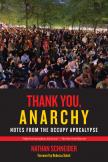A Process of Protest
Thank You, Anarchy: Notes from the Occupy Apocalypse is the title of this book. Wait, don’t run away! The Occupy Wall Street movement stirs up certain strong feelings in people, myself included. I am a big fan of protests, and I consider myself a pretty involved person, attending demonstrations and rallies when I feel it necessary. I was not, however, a big fan of the Occupy movement. I took a moment before starting to read this book in order to clear my head of the thoughts I already had, not only about the movement, but about anarchy as well. And I couldn’t be happier that I made that decision.
This detailed account of the inception and growth of the Occupy movement touched me in a way I wasn’t at all expecting: I reconsidered my views on the movement and on anarchy, of which I must admit I had pretty undeveloped notions. Schneider describes his approach thus: “I started looking for the planning process of some great cause to follow and to learn from. It turned out that this would be easier than I expected—and that the spectacle would be the process itself.”
The book is a mostly chronological account of the Occupy Wall Street movement through its first year. I fell into the same line of thinking as many spectators of this movement: it was disorganized, lacked a clear vision, lacked an actual set of demands and was not adhering to nonviolence. After a few weeks of cheering the movement on, I started losing confidence in its ability to get anything done. Schneider succeeded in schooling me that there was something more important to understand about the Occupy movement: the movement itself. “It was there to change us first and make demands later.”
Occupy Wall Street struggled with the same issues the bystanders struggled with: Do we adopt a list of demands? Do we elect a leader? Do we agree on tactics of marches and rallies? And it is in this debate that we learn the true point of the movement: to organize, to socialize, to think about a better world. There were direct actions pertaining to a multitude of issues: labor disputes, police brutality, housing issues, corruption, the financial system. Tangible demands were made and sometimes achieved. In other instances, however, the movement just demanded a space to convene, a voice, a third way. And at even other times, there were disagreements over what was achievable, and what the participants wanted to achieve. By my traditional way of thinking, I would say this movement was all over the map. But I believe most Occupiers would want us to consider new ways of thinking, new paradigms and possible worlds just as a practice of thinking, a practice of acting.
About halfway through the book, when Schneider’s interviewees were really starting to challenge my thinking, I appreciated that the not-so-objective reporter had held my hand through the first few chapters. Rather than hit the reader over the head with anarchism and a paradigm shift, Schneider eases into this thing called anarchy, activism and organization. And the movement made sense. Sure, there are disagreements, and participants made mistakes. But how can you fault someone, or even a movement, for being human? This is what I learned.
After introducing the reader to the painstaking General Assembly, the mic-checks and the heated debates over nonviolence versus diverse tactics, Schneider brings in a religious element to his observations. Not only were religious people and people of faith active in the Occupy movement; the environment itself often had overtones of a faith-based movement, with ritual, focus on helping and listening to “the other” and assisting those in need when times were dire, like after Superstorm Sandy. And it made sense: “Religion, by and large, is how Americans organize and imagine their way toward a different kind of world.” So we’re doing it already!
Schneider writes, “Protest movements can and do change the world, though it takes time and never happens quite the way anyone expects.” And why should it? Some might ask, what did they accomplish? They accomplished the thing itself. The participants accomplished a movement that made people think for more than one day of action. They changed themselves. “People who were once merely interested in social change became committed to it,” Schneider writes. Activists considered a new way of organizing, through anarchy, where each participant’s vision is expressed and considered. Where processes are long, but of greater equality. Where there is room for multiple visions and tactics and outcomes.
With the help of the people he interviews, Schneider points out that the Occupy movement, had it focused on a one-day event in September, could have easily fallen by the wayside, kicked to the curb with other protests and days of action. “The world-wide protests against the [U.S.] invasion of Iraq were the largest mobilization in history, and the war happened anyway. The newspapers hardly even noticed the opposition,” he writes. But because of the way people organized, because it was a process, not an end goal, the movement lived on. There was no list of demands to discard, or superficially accomplish. There was no leader to mandate tactics and procedures. The movement was possible because of anarchy. I get it. Thank you, anarchy.
This article also appeared in print, under the headline “A Process of Protest,” in the May 12, 2014, issue.








